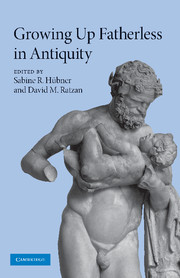Book contents
- Frontmatter
- Contents
- List of figures
- List of tables
- List of contributors
- Acknowledgments
- Note on abbreviations
- INTRODUCTION
- 1 Fatherless antiquity? Perspectives on “fatherlessness” in the ancient Mediterranean
- PART I COPING WITH DEMOGRAPHIC REALITIES
- PART II VIRTUAL FATHERLESSNESS
- PART III ROLES WITHOUT MODELS
- 8 Diomedes, the fatherless hero of the Iliad
- 9 Sons (and daughters) without fathers: fatherlessness in the Homeric epics
- 10 Absent Roman fathers in the writings of their daughters: Cornelia and Sulpicia
- PART IV RHETORIC OF LOSS
- Bibliography
- Index
10 - Absent Roman fathers in the writings of their daughters: Cornelia and Sulpicia
Published online by Cambridge University Press: 30 July 2009
- Frontmatter
- Contents
- List of figures
- List of tables
- List of contributors
- Acknowledgments
- Note on abbreviations
- INTRODUCTION
- 1 Fatherless antiquity? Perspectives on “fatherlessness” in the ancient Mediterranean
- PART I COPING WITH DEMOGRAPHIC REALITIES
- PART II VIRTUAL FATHERLESSNESS
- PART III ROLES WITHOUT MODELS
- 8 Diomedes, the fatherless hero of the Iliad
- 9 Sons (and daughters) without fathers: fatherlessness in the Homeric epics
- 10 Absent Roman fathers in the writings of their daughters: Cornelia and Sulpicia
- PART IV RHETORIC OF LOSS
- Bibliography
- Index
Summary
As a point of comparison with the topic of this essay – two Roman daughters of the Classical era, and how they write about their own absent fathers – I would like to begin by looking at the presence of a Roman father in an autobiographical work written by his son, the Augustan poet Ovid. In Tristia 4.10, while recounting some significant and emotionally charged moments from his own life, Ovid makes several references to his father. These references testify to the considerable control that Ovid's father managed to exert over Ovid's life, and to Ovid's deferential stance toward him. Their prominence in Ovid's literary autobiography also testifies to the importance that Ovid accorded, and wished his audience to accord, to his father's influence.
As long as Ovid's father lived, of course, Ovid was legally a filiusfamilias under patria potestas, his father's power of life or death over his children. As such, he was in no position to contest his father's authority. Throughout Tristia 4.10 – written from exile on the Black Sea, several years after his father's death – Ovid acknowledges his father's role in his life, both directly and obliquely. Yet even there Ovid does not challenge, or criticize, his father's decisions, presumably out of deep reverence for his memory.
At Tristia 4.10.15–16 Ovid informs us that because of his father's attentiveness (curaque parentis), he and his brother – exactly one year Ovid's senior – left their hometown of Sulmo as small boys to be educated by the most distinguished teachers in Rome.
- Type
- Chapter
- Information
- Growing Up Fatherless in Antiquity , pp. 175 - 192Publisher: Cambridge University PressPrint publication year: 2009
- 5
- Cited by



